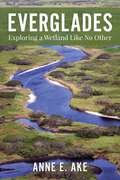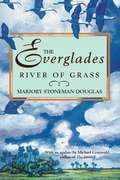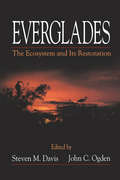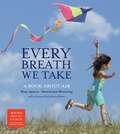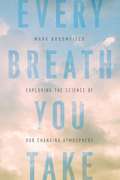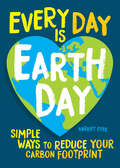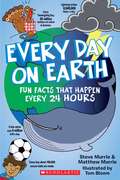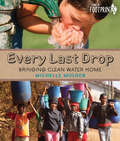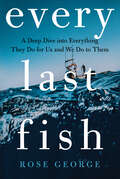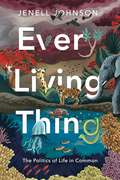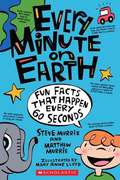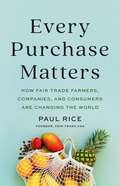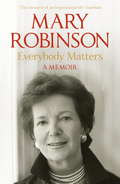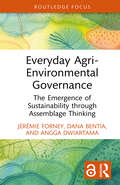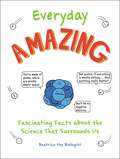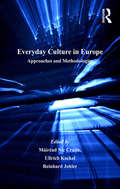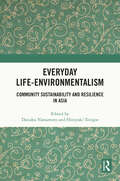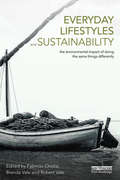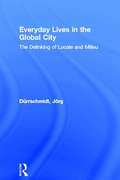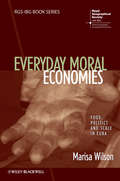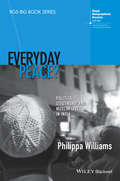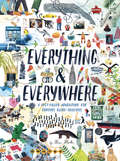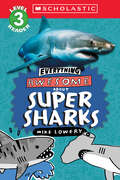- Table View
- List View
Everglades Patrol
by Tom ShirleyAs law enforcement officer and game manager for the Florida Game and Fresh Water Fish Commission, Lt. Tom Shirley was the law in one of the last true frontiers in the nation--the Florida Everglades.In Everglades Patrol, Shirley shares the stories from his beat--an ecosystem larger than the state of Rhode Island. His vivid narrative includes dangerous tales of hunting down rogue gladesmen and gators and airboat chases through the wetlands in search of illegal hunters and moonshiners.During his thirty-year career (1955-1985), Shirley saw the Glades go from frontier wilderness to "ruination" at the hands of the Army Corps of Engineers. He watched as dikes cut off the water flow and controlled floods submerged islands that had supported man and animals for 3,000 years, killing much of the wildlife he was sworn to protect.
Everglades: Exploring a Wetland Like No Other
by Anne AkeThe Everglades is an environment like no other, spanning from coast to coast across South Florida. With unique creatures like the American Alligator to beautiful birds such as the Great Blue Herons, lovers of wildlife and nature are sure to find enjoyment out on an airboat, paddling their kayak, or walking the boardwalks.In Everglades: Exploring a Wetland Like No Other, author Anne E. Ake discusses crucial facts, figures, and details about the glades while also enlightening readers on key information regarding conservation and restoration. This book covers important topics such asThe prevalent water level issues the glades face Invasive species such as the Burmese PythonUp-to-date data on wildlife and environmental factorsCalls to action for conservation and restoration effortsWith over 90 color photos from a variety of stunning wildlife photographers including the author herself, readers new to the Everglades and seasoned glades visitors alike will find beauty and inspiration from this book.
Everglades: River of Grass
by Marjory Stoneman DouglasBefore 1947, when Marjory Stoneman Douglas named The Everglades a "river of grass," most people considered the area worthless. She brought the world's attention to the need to preserve The Everglades. In the Afterword, Michael Grunwald tells us what has happened to them since then. Grunwald points out that in 1947 the government was in the midst of establishing the Everglades National Park and turning loose the Army Corps of Engineers to control floods--both of which seemed like saviors for the Glades. But neither turned out to be the answer. Working from the research he did for his book, The Swamp, Grunwald offers an account of what went wrong and the many attempts to fix it, beginning with Save Our Everglades, which Douglas declared was "not nearly enough." Grunwald then lays out the intricacies (and inanities) of the more recent and ongoing CERP, the hugely expensive Comprehensive Everglades Restoration Plan.
Everglades: The Ecosystem and Its Restoration
by Steve Davis John C. OgdenThe 31 chapters provide a wealth of previously unpublished information, plus topic syntheses, for a wide range of ecological parameters. These include the physical driving forces that created and continue to shape the Everglades and patterns and processes of its flora and fauna. The book summarizes recent studies of the region's vegetation, alligat
Every Breath We Take: A Book About Air
by Dominique Browning Maya AjmeraClean air is essential for all living creatures—plants, animals, and people—to live healthy lives. Every Breath We Take is a positive, life-affirming look at clean air, with a subtle message about how air can be dirtied—and how it can be cleaned up. Photographs of beautiful children around the world exploring air through touch, smell, sound, and sight underscore the importance of clean air to all life on earth. This is science that surrounds us.The first step to cherishing something is recognizing its importance and understanding why it is necessary. A portion of the proceeds from the sales of this book will be donated to Moms Clean Air Force, a national movement of over a half million moms, dads, and grandparents who are protecting the right of every child to breathe clean air.
Every Breath You Take: Exploring the Science of Our Changing Atmosphere
by Mark BroomfieldA leading authority in the field takes readers on a fascinating and surprising journey through the atmosphere—from our lungs to outer space—that will leave readers breathless.With seven million early deaths each year linked to air pollution, air quality is headline news around the world. But even though we breathe in and out every few seconds, few of us really know what&’s in the air all around us. In Every Breath You Take, air quality specialist—and full-time breather—Dr. Mark Broom connects the dots from the atmosphere on distant planets to the holes in the ozone layer to the particles in our lungs. How do we measure air pollution and what on earth is an odor panel? Why are property prices higher upwind of cities? And will our grandchildren inherit an atmosphere worth breathing? With keen insights on the atmospheric effects of climate change, industrial air pollution, and urbanization in the twenty-first century, Every Breath You Take combines the latest scientific research with Mark&’s personal stories to answer these questions and many more in a readable and surprising journey through the atmosphere.
Every Day Is Earth Day: Simple Ways to Reduce Your Carbon Footprint
by Harriet DyerFast facts on fast fashion, throwaway plastics, and other climate catastrophes that you can do something about—today. Every Day Is Earth Day is full of simple ways to reduce your environmental impact. From tips on creating a more eco-friendly home and ways to reduce your plastic use, to advice on shopping sustainably, within these pages you will discover everything you need to know to help you make planet-friendly choices and live a more sustainable life. Also included are tips on taking it to the next level and becoming an activist—to effect wider change and encourage businesses and governments to create a future that&’s healthier, safer, and cleaner!
Every Day on Earth: Fun Facts That Happen Every 24 Hours
by Matthew Murrie Steve Murrie Tom BloomDiscover all of the amazing things that can happen around the world in just one day! You already know all of the amazing things that can happen in just one minute on Earth, so think of what could happen in a whole day! Your taste bud cells are replaced at a rate of 50,000 a day. Almost 40,000 trees are cut down every day just to make paper bags. And a mayfly lives its entire life in a single day. This book is full of fun facts about space, technology, pop culture, food, animals, sports, the human body, and more!
Every Last Drop: Bringing Clean Water Home (Orca Footprints)
by Michelle MulderIn the developed world, if you want a drink of water you just turn on a tap or open a bottle. But for millions of families worldwide, finding clean water is a daily challenge, and kids are often the ones responsible for carrying water to their homes. Every Last Drop looks at why the world's water resources are at risk and how communities around the world are finding innovative ways to quench their thirst and water their crops. Maybe you're not ready to drink fog, as they do in Chile, or use water made from treated sewage, but you can get a low-flush toilet, plant a tree, protect a wetland or just take shorter showers. Every last drop counts!
Every Last Fish: A Deep Dive into Everything They Do for Us and We Do to Them
by Rose GeorgeA fresh and fascinating take on fish, the fishing industry, and our shared future, from one of our most intrepid and entertaining nonfiction writers. Slippery, wet, and strange: Fish can be easier to think of as food than as fellow animals. But what do we know about these creatures we meet on our dinner table and how they got there? For the first time in history, humans are eating more farmed fish than wild, and our fish consumption is predicted to increase. But with warming oceans, diminishing fish stocks, and questions about fish farming practices, where will the fish come from? In Every Last Fish, Rose George dives into these questions by exploring the vast industries that support our appetite for fish sticks and salmon burgers, and the colossal illegal fishing trade whose practices and standards are unmonitored and often dangerous. Journeying to the bottom of the ocean and back, she examines the machinations of this $200 billion food system—one that’s growing rapidly even as fish populations disappear. Along the way, George introduces us to the people on the front lines of fishes and fishing: fishermen, divers, marine biologists, fish fryers, and fishwives. She presents minnows who shout; discovers the underwater soap operas of wolffish; and, despite her constant seasickness, boards trawlers to see firsthand the impact of fishing on our emptying oceans. Her journey ends at the fish counter, with guidance for readers looking to make better choices, both for the ocean’s health and their own. Ranging from Alaska to the United Kingdom to Senegal and beyond, Every Last Fish is an unforgettable trip through the ocean’s inhabitants and workers. With irresistible wit and an eye for the unusual, George reveals the unseen and endangered world behind what you buy at the seafood counter, while also bringing to life that dead fish on your plate.
Every Living Thing: The Politics of Life in Common (RSA Series in Transdisciplinary Rhetoric)
by Jenell JohnsonThis book examines the question of what we mean when we talk about life, revealing new insights into what life is, what it does, and why it matters. Jenell Johnson studies arguments on behalf of life—not just of the human or animal variety, but all life. She considers, for example, the Standing Rock Sioux tribe’s fight for water, deep ecologists’ Earth First! activism, the Voluntary Human Extinction Movement, and astrophysicists’ positions on Martian microbes. What she reveals is that this advocacy—vital advocacy—expands our view of what counts as life and shows us what it would mean for the moral standing of human life to be extended to life itself.Including short interviews with celebrated ecological writer Dorion Sagan, former NASA Planetary Protection Officer Catharine Conley, and leading figure in Indigenous and environmental studies Kyle Whyte, Every Living Thing provides a capacious view of life in the natural world. This book is a must-read for anyone interested in biodiversity, bioethics, and the environment.
Every Minute on Earth: Fun Facts that Happen Every 60 Seconds
by Matthew Murrie Steve MurrieDiscover all of the amazing things that can happen around the world in just one minute! In the minute it could take you to read this page, the Earth will be hit by 6,000 lightning strikes; 2,137 pounds of popcorn will be eaten; 10,000 pieces of skin will be lost from your body; 21,000 pizzas will be baked; 954 camera phones will be sold worldwide; the International Space Station will travel 289 miles in its orbit around the Earth; and 750,000 gallons of water will tumble over Niagara Falls. The Earth and its inhabitants are active every minute of the day. Isn't it amazing what can happen in such a short amount of time?
Every Purchase Matters: How Fair Trade Farmers, Companies, and Consumers Are Changing the World
by Paul RiceNATIONAL BESTSELLER * From the founder and CEO of Fair Trade USA, a critical account of the past, present and future of conscious capitalism—the change it has wrought in the world and the potential it still has to confront our greatest challenges. We all have the power to change the world through the products we buy. This simple premise has driven the growth of the conscious consumer movement for decades. Indeed, what started with a handful of niche sustainability brands has exploded into the mainstream with labels like Organic, Non-GMO, and Fair Trade Certified now adorning products in major retailers across the country. Yet the true promise of ethical sourcing and conscious consumerism has not been fully realized. Paul Rice has dedicated his career to helping consumers and businesses embrace the power they have to protect the environment and improve the lives of farmers and workers on the far side of our global supply chains. In Every Purchase Matters, Rice reveals the untold story of the Fair Trade movement and its significance for us all. Calling on the close relationships he cultivated over the last forty years with the pioneers of ethical sourcing—CEOs, activists, grassroots farmer leaders, and consumer advocates—Rice gives voice to the visionaries and practitioners who are making sustainable business the new normal. These protagonists share successes and failures, lessons learned, and their extraordinary impact in communities around the world. Their stories illuminate how sustainability is good not only for people and planet but also for business. Whether you&’re a consumer, a business leader, or an investor, Every Purchase Matters offers a rich and persuasive case for conscious capitalism—the change it has brought and the potential it still has to create a more just, equitable, and sustainable world.
Everybody Matters: A Memoir
by Mary RobinsonShortlisted for the Political Book Awards 2013 Political Book of the YearThe first woman President of Ireland, who became UN High Commissioner for Human Rights, Mary Robinson has spent her life in pursuit of a fairer world.Now, for the first time, she reveals what lies behind the vision, strength and determination that has helped her to achieve so much for human rights around the globe.She describes the upbringing which gave her her strong sense of values and how she came into painful conflict with her parents - marrying against their wishes and, later, helping to legalise contraception in a deeply Catholic Ireland.As a barrister she won landmark cases advancing the causes of women and the marginalised against the prejudices of the day. When - to the surprise of many - she became the first woman President of Ireland in 1990, she put Ireland firmly on the international stage.Accepting the position of UN High Commissioner for Human Rights in 1997 was her biggest challenge and here she describes the huge political difficulties she encountered among the many triumphs. Subsequently, based in New York, she led Realizing Rights for eight years, pioneering how to implement in practice economic and social rights: working in African countries on health, decent work, corporate responsibility and women's empowerment in peace and security. Now heading her own Climate Justice foundation she has succeeded in finding the independence she needs to work effectively on behalf of the millions of poor around the world most affected by climate change. Told with the same calm conviction and modest pride that has guided her life, Everybody Matters will inspire everyone who reads it with the belief that each of us can, in our own way, help to change the world for the better.
Everybody Needs a Rock
by Byrd BaylorBaylor provides ten rules for finding a rock. "Not just any rock, Baylor is careful to note, but 'a special rock that you find yourself and keep as long as you can--maybe forever."
Everyday Agri-Environmental Governance: The Emergence of Sustainability through Assemblage Thinking (Routledge Focus on Environment and Sustainability)
by Jérémie Forney Dana Bentia Angga DwiartamaRevitalising the way the social sciences question agri-environmental governance, this book introduces "the everyday governance approach" as a means to improving the sustainability of agriculture and food systems.The "everyday" refers to localised practices, specific networks, and practical norms that emerge in a process of interaction, translation, and reinterpretation. The authors build this approach on assemblage thinking and theory, which focuses on the collective production of the social through complex sets of connections. For this reason, assemblage thinking becomes a particularly productive guide in exploring how everyday governance is co-produced in the interaction between numerous social processes involving a diversity of actors and instruments. The authors navigate between original and contrasting case studies from Switzerland, Indonesia, and the European Union in order to reorient attention to the transformative nature of governance, which they locate along four different dimensions of the everyday: (1) the interdependence of instruments within a wider governance assemblage; (2) the uncertainty and unpredictability of effects in agri-environmental governance; (3) the distributed nature of agency and its implication for power relations; (4) the importance of capacities in the transformation of agri-food systems. This book calls for a redesigning of agri-environmental governance that should move away from the setting of fix and precise objectives and solutions, and rather aim for a consolidation of sound foundations on which desirable futures can emerge.The book will be an essential read for students and scholars interested in sustainable agriculture and food systems, governance modes and approaches, and sustainability more broadly.
Everyday Amazing: Fascinating Facts about the Science That Surrounds Us
by Beatrice the BiologistLike fan mail addressed to the natural world, Everyday Amazing is filled with uplifting and interesting musings on science from Beatrice the Biologist. Beatrice the Biologist is an easily amused former high school biology teacher with a soft spot for the mind-blowing science we encounter daily that we often take for granted. In Everyday Amazing, she shines the spotlight on ten different types of amazing everyday scientific facts in short chapters full of fun and fascinating tidbits bound to both entertain you and expand your horizons! Learn the basics of atomic science, sound waves, bioscience, microbiology, and more in accessible chapters offering a fresh perspective on concepts you may have learned about, but aren’t totally clear on. Quirky illustrations throughout add to the fun! Fall in love with science with Beatrice the Biologist in Everyday Amazing!
Everyday Culture in Europe: Approaches and Methodologies (Progress In European Ethnology Ser.)
by Máiréad Nic CraithThis book discusses the history and contemporary practice of studying cultures 'at home', by examining Europe's regional or 'small' ethnologies of the past, present and future. With the rise of nationalism and independence in Europe, ethnologies have often played a major role in the nation-building process. The contributors to this book offer case studies of ethnologies as methodologies, showing how they can address key questions concerning everyday life in Europe. They also explore issues of European integration and the transnational dimension of culture in Europe today, and examine how regional ethnologies can play a crucial part in forming a wider 'European ethnology' as local participants have experience of combining identities within larger regions or nations.
Everyday Life-Environmentalism: Community Sustainability and Resilience in Asia
by Daisaku Yamamoto Hiroyuki TorigoeThis book provides one of the first systematic introductions to the Japanese concept of life-environmentalism, Seikatsu-Kankyo Shugi. This concept emerged in the 1980s as a shared research framework among Japanese social scientists studying the adverse consequences of postwar industrialization on everyday life in communities. Life-environmentalism offers a lens through which the agency of small communities in sustaining their everyday life and living environment can be understood. The book provides an overview of this approach, including intellectual backgrounds and foundational concepts, along with a variety of empirical case studies that examine environmental and sustainability issues in Japan and other parts of Asia. It also includes critical reflections on the approach in light of contemporary sustainability challenges. The empirical topics covered in the book include local community responses to development projects, resource governance, disaster response and recovery, and historical environmental preservation. The chapters are contributed by researchers working at the forefront of the field. It provides only a glimpse into the vast literature that awaits further exploration and engagement in the future. The book is suitable for upper undergraduate students, graduate students, and researchers interested in environmental problems, sustainability and resilience, disaster mitigation and response, and regional development in Asian contexts, particularly Japan. It is well-suited for courses in anthropology, geography, sociology, urban and regional planning, political science, Asian studies, and environmental studies.
Everyday Lifestyles and Sustainability: The Environmental Impact Of Doing The Same Things Differently
by Robert Vale Brenda Vale Fabricio ChiccaThe impact of humanity on the earth overshoots the earth’s bio-capacity to supply humanity’s needs, meaning that people are living off earth’s capital rather than its income. However, not all countries are equal and this book explores why apparently similar patterns of daily living can lead to larger and smaller environmental impacts. The contributors describe daily life in many different places in the world and then calculate the environmental impact of these ways of living from the perspective of ecological and carbon footprints. This leads to comparison and discussion of what living within the limits of the planet might mean. Current footprints for countries are derived from national statistics and these hide the variety of impacts made by individual people and the choices they make in their daily lives. This book takes a ‘bottom-up’ approach by calculating the footprints of daily living. The purpose is to show that small changes in behaviour now could avoid some very challenging problems in the future. Offering a global perspective on the question of sustainable living, this book will be of great interest to anyone with a concern for the future, as well as students and researchers in environmental studies, human geography and development studies.
Everyday Lives in the Global City: The Delinking of Locale and Milieu
by Jörg DürrschmidtRejecting simplifying notions of globalisation as a macro-economic force, this book provides a grounded picture of the various ways in which people's biographies are tied up with the global cultural economy. The main argument of the book is that the globalisation of lives is experienced by people as the 'extension' of their 'milieux' both spatially and symbolically.
Everyday Moral Economies: Food, Politics and Scale in Cuba (RGS-IBG Book Series)
by Marisa WilsonOffering a rare glimpse of rural life in modern-day Cuba, this book examines how ordinary Cubans carve out their own spaces for ‘appropriate’ acts of consumption, exchange, and production within the contradictory normative and material spaces of everyday economic life. Discusses the conflict between the socialist-welfare ideal of food as an entitlement and the market value of food as a commodity Bridges the fields of human geography and anthropology Approaches food networks and the scale of food systems in a novel way Provides a comprehensive look at Cuba today, with coverage of history, politics, economics, and social and environmental justice Enhanced by vivid photos from the field
Everyday Peace?: Politics, Citizenship and Muslim Lives in India (RGS-IBG Book Series)
by Philippa WilliamsWinner of the 2016 Julian Minghi Distinguished Book Award of the Political Geography Specialty Group at the AAGProviding important insights into political geography, the politics of peace, and South Asian studies, this book explores everyday peace in northern India as it is experienced by the Hindu-Muslim community. Challenges normative understandings of Hindu-Muslim relations as relentlessly violent and the notion of peace as a romantic endpoint occurring only after violence and political maneuverings Examines the ways in which geographical concepts such as space, place, and scale can inform and problematize understandings of peace Redefines the politics of peace, as well as concepts of citizenship, agency, secular politics, and democracy Based on over 14 months of qualitative and archival research in the city of Varanasi in Uttar Pradesh, India
Everything & Everywhere: A Fact-Filled Adventure for Curious Globe-Trotters
by Marc MartinFrom Hong Kong to Reykjavík, Ulaanbaatar to New York City, enjoy a lush and unexpected journey around the world to discover what makes each place unique. Sleepy sloths, colorful cows, staggering skylines, terrible traffic—countless surprises await! All you need is a good guide and a little curiosity . . . so, what are you waiting for? Let's go! From award-winning author and illustrator Marc Martin comes a quirky, fact-filled adventure for curious globe-trotters, young and old.
Everything Awesome About: Super Sharks (Everything Awesome About)
by Mike LoweryLearn everything that's AWESOME about sharks, in this nonfiction Reader that combines cartoon illustrations and photographs!Do you know which shark has 25 rows of backward-facing teeth? Or which shark is covered in a protective stinky slime? It's time to meet... the SUPER SHARKS!Find out all this and more, in Everything Awesome About: Super Sharks, a one-stop shop for the shark-obsessed kid who wants to start reading on their own! With a highly visual approach that mixes kid-friendly cartoons and engaging photographs, this Reader packs in the facts and is sure to become a quick favorite for shark obsessives.Learn the top facts about your favorite shark breeds, and everything that's awesome about the most feared creatures in the sea. This Level 3 Reader is perfect for kids who are starting to read on their own, and want to build reading confidence and develop vocabulary skills while learning cool facts about their favorite beasts.Be sure to check out more in this series, with Everything Awesome About: Dangerous Dinosaurs!

